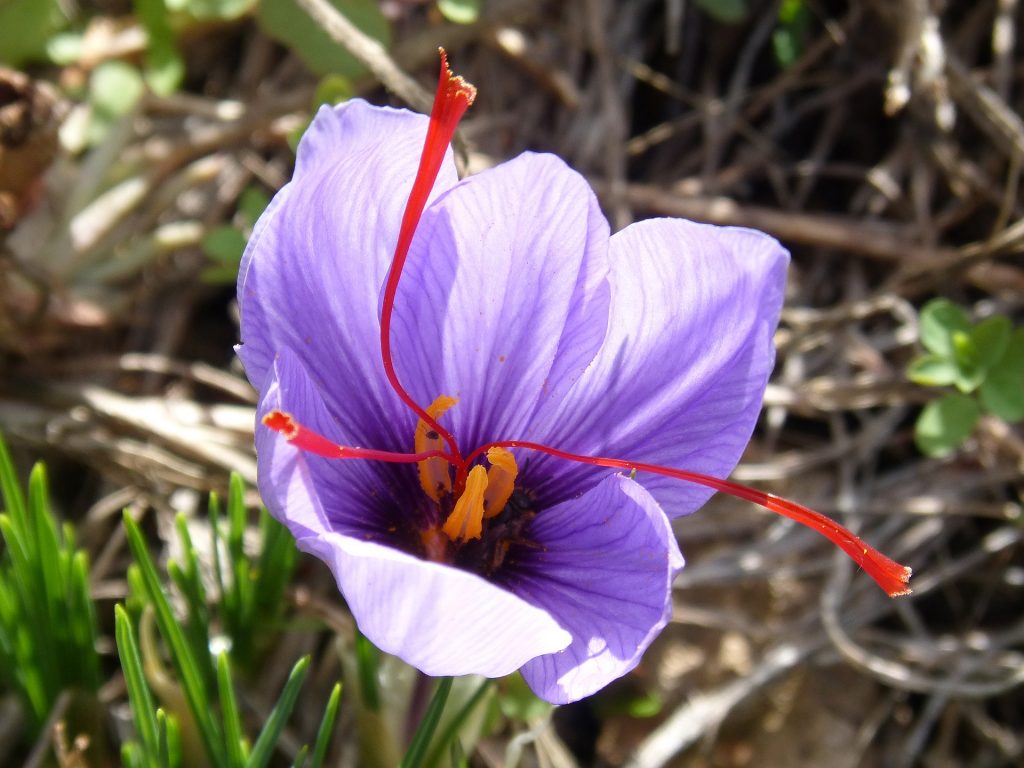 Saffron is a spice produced from the dried stigma of the blossom of the Crocus sativus plant. Saffron is a very expensive spice that is used traditionally in cooking. Medicinally, saffron has also been used for its ability to treat a range of health conditions including digestive system problems, menstrual disorders, memory problems, inflammation, and vomiting, and in addition, saffron has been shown to have potential as an anticancer agent. However, saffron has also been used traditionally to treat depression, and this traditional use is supported by evidence from recent scientific investigations. For example, in one study, researcher compared the effects of saffron with fluoxetine in the treatment of mild to moderate depression. Subjects received either 30 mg per day of saffron stigma extract or 20 mg per day of the antidepressant drug fluoxetine for 6 weeks. Both fluoxetine and saffron improved the symptoms of depression in the patients and there was no significant difference between the effectiveness of the treatments.
Saffron is a spice produced from the dried stigma of the blossom of the Crocus sativus plant. Saffron is a very expensive spice that is used traditionally in cooking. Medicinally, saffron has also been used for its ability to treat a range of health conditions including digestive system problems, menstrual disorders, memory problems, inflammation, and vomiting, and in addition, saffron has been shown to have potential as an anticancer agent. However, saffron has also been used traditionally to treat depression, and this traditional use is supported by evidence from recent scientific investigations. For example, in one study, researcher compared the effects of saffron with fluoxetine in the treatment of mild to moderate depression. Subjects received either 30 mg per day of saffron stigma extract or 20 mg per day of the antidepressant drug fluoxetine for 6 weeks. Both fluoxetine and saffron improved the symptoms of depression in the patients and there was no significant difference between the effectiveness of the treatments.

Saffron may have antidepressant effects in humans. These effects may be equal to the antidepressant drugs imipramine and fluoxetine. Saffron is contraindicated in pregnancy because it may cause abnormal bleeding and platelet adhesion. However, it is generally regarded as safe as it is a normal food ingredient in the form of a spice.
In another study, researchers investigated the effects of 30 mg per day saffron petal extract or 20 mg per day of the drug fluoxetine, on patients with mild to moderate depression. The results showed that following 8 weeks of treatment, saffron petals and fluoxetine were both equally as effective at improving depression with a remission rate of 25 %. There were no significant differences in the effectiveness of the treatments. The use of saffron as an antidepressant has also been compared to the antidepressant drug, imipramine. For example, researchers administered 30 mg of saffron stigma extract or 100 mg of the antidepressant drug imipramine to a group of patients who had mild to moderate depression. The subjects took the saffron or imipramine for 6 weeks. The results showed that there was an improvement in the depression experienced by both the saffron and the imipramine group, but that neither treatment was superior to the other. However the saffron was well tolerated with minimal adverse effects.

Saffron is a spice made from the stigma of the blossom of the Crocus sativus plant. Saffron is highly expensive and has traditionally been used as both a food additive and a medicinal plant.
It is unclear how saffron can exert its beneficial effects on depression, but this may relate to the presence of the active ingredients crocin and safranal. It has been suggested that both crocin and safranal may inhibit reuptake of dopamine, norepinephrine and serotonin in neurones, thus potentiating their effects. Whatever the mechanism, it appears that saffron is an effective treatment for those with mild to moderate depression, and can significantly improve the outcome of the disorder to at least the same extent as the antidepressant drugs imipramine and fluoxetine. As with other herbs and spices, the main advantage of saffron appears to be its lack of side effects, as when used as an antidepressant it appears to be well tolerated. Both the petals and the stigma of the plant show antidepressant effects. Saffron is also available as a supplement, often standardised to contain the active ingredient safranal. Use of saffron in cooking may not only provide flavour to food, it may also contribute to creating improved mental health.
Eat Well, Stay Healthy, Protect Yourself
RdB
